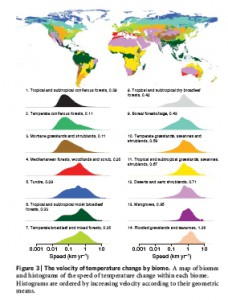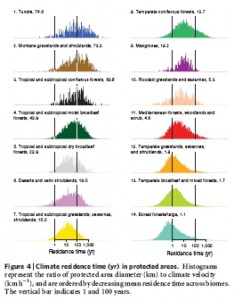IITA has uploaded to youtube a longish interview with renowned banana expert Prof. Ivan Buddenhagen of UC Davis. Lots of fascinating insights, both technical and historical. What for me was the money quote comes at the beginning of the second installment (of five). Asked about what direction banana improvement should take at IITA, he says: “The first thing is to get more germplasm.” Thanks to Jacob for the tip.
How fast will this climate change be anyway?
![]() Well, in terms of distance along the Earth’s surface, about 400 m per year on average, ranging from 80 m per year in mountainous regions to 1.26 km per year in deserts. That’s according to a new paper in Nature by Loarie et al. 1 Compare that with figures of postglacial migration rates of <100 m per year for some trees. Here’s a map of the speed of temperature change by biome from the Nature paper (click to enlarge).
Well, in terms of distance along the Earth’s surface, about 400 m per year on average, ranging from 80 m per year in mountainous regions to 1.26 km per year in deserts. That’s according to a new paper in Nature by Loarie et al. 1 Compare that with figures of postglacial migration rates of <100 m per year for some trees. Here’s a map of the speed of temperature change by biome from the Nature paper (click to enlarge).
And here’s the “persistence time” for protected areas in different biomes, i.e. the diameter of protected areas divided by the climate velocity.
The persistence time — which is how long it takes for the current climate to cross a protected area — exceeds 100 years for only about 8% of protected areas. And that, dear reader, is why we need protected areas that are larger and more connected. Oh, and genebanks.
Nibbles: Vavilov on couscous, Molecular studentships, Goat genetics, Svalbard Global Seed Vault, Sweet potato, New Agriculturist, Vietnam and CC, Liberian ag research, Cuisine
- Couscous deconstructed.
- China and Bioversity collaborate on molecular marker training.
- Neolithic legging helps unravel the history of the goat in Europe.
- Dag’s cool Svalbard pix.
- CIP launches Sweetpotato Action for Security and Health in Africa (SASHA).
- The new New Agriculturist does markets.
- Climate change and rice cultivation in the Mekong Delta.
- The perils of agricultural research in Liberia: one trial up in smoke, another stolen. Bummer.
- Ok, I had no idea there was a Tasting Cultures Foundation. Thanks, Facebook.
Re-inventing the genebank. Not.
![]() Jeffrey Walck and Kingsley Dixon 2 have a piece on genebanks in December’s Nature entitled “Time to future-proof plants in storage.” 3 It says some important things, but in a way that suggests that nobody has thought of them before, or has done anything about it, which I think needs to be countered. 4 The article is behind a paywall, alas.
Jeffrey Walck and Kingsley Dixon 2 have a piece on genebanks in December’s Nature entitled “Time to future-proof plants in storage.” 3 It says some important things, but in a way that suggests that nobody has thought of them before, or has done anything about it, which I think needs to be countered. 4 The article is behind a paywall, alas.
Here’s the crux of Walck and Dixon’s beef.
At low temperatures, seeds can remain viable for hundreds if not thousands of years. Herein lies the problem: such seeds are literally frozen in time, a snapshot of the genetic diversity of a species at a particular point. Attempts to revive a seed in future habitats very different from those in which it developed could be doomed to failure. A germinating seed is genetically programmed to respond to a precise interplay of temperature and moisture that determines the climatic conditions in which it can best develop. In an environment that lacks the right temperature and moisture balance — which is likely to be disrupted by climate change — a seed will either fail to germinate or the seedling will perish soon afterwards (see Fig. 1).
What are their suggestions for getting around this problem? Here’s a summary:
- 1. Harvest as much genetic diversity as possible, including at the edge of species ranges, and at different points in time. And harvest large quantities of seed whenever possible.
- 2. Screen the plants for their adaptation to different environments. “For instance, subjecting seedlings to increased temperatures could allow the selection of those with higher heat tolerance.”
- 3. Use climate models to identify areas where different populations will be best adapted. “…climate change will alter the home range of a species, so restorers can be sure to reintroduce seeds in places that will match their particular germination requirements.”
- 4. “Policy-makers must get involved too: a comprehensive international agreement is required to coordinate the collection of genetic material, particularly for cross-border wild species.”
So, that would be collect properly, evaluate, match seeds to environments and put in place an international policy infrastructure. Doh! I really can’t see anything in that list that genebanks are not already trying to do. Can you? Maybe they’re not doing it as well as they might, and certainly the policy environment is still not ideal, but there’s surely nothing particularly new about these recommendations. Sure, it is always useful to remind a community about best practices, but it would have been nice to point out that genebank managers around the world know what these are, and are in fact trying to follow them.
If they had wanted to suggest something that isn’t already in place, why didn’t they mention the pressing need for a comprehensive global information system? Now that would be an improvement. And yes, we — and they — are working on it.
Nibbles: Goldman Environmental Prize, UK networking, European landraces publication, Seed Warriors, India agrobiodiversity sites, Beer books, Teosinte, Drought foods, Sugarcane genebank, Regional genebank in South Asia, Rhubarb, Annals, Food articles, Cryo
- Goldman Prizewinner Jesús León Santos: “It is time we recognize that traditional agricultural methods can make strong contributions to biodiversity conservation. We should encourage it and value it as a way to produce healthy foods that conserve and care for the environment.” Time indeed.
- British twofer: The Food Climate Research Network aims “to better understand how the food system contributes to greenhouse gas emissions, and to research and promote ways of reducing them.” Then there’s the Foresight Project on Global Food and Farming Futures. Will they talk to each other, I wonder.
- From Bioversity, “European landraces: on-farm conservation, management and use.” I wonder if the Foresight Project will download a copy.
- The “Seed Warriors” trailer. Oscar buzz, I hear.
- Agricultural biodiversity heritage sites in India. Ethnobotanist brings together information on food plants used during drought. Mashup, anyone?
- A book about beer. My two favourite things. Oooh, here’s another couple! And it’s not over: Spiegel weighs in on the old chestnut about beer being the reason for agriculture. My tankard runneth over.
- CIMMYT team monitors teosinte. Teosinte planning to fight back.
- Regional sugarcane genebank is actually being used! Heartwarming. Oh, and, coincidentally, here’s a history of Indian sugarcane breeding.
- “A SAARC Plant Genetic Resource Bank for rice, wheat and maize may be created to facilitate free exchange of germplasm between the member countries. To begin with, the Indian Gene Bank facilities may be utilized, with suitable modalities.” Not so heartwarming.
- The Russian roots of Alaskan rhubarb. Take that, Palin! Note the bit about St Isaac’s Cathedral, which of course sits opposite VIR. How apposite is that?
- Nigel Chaffey rounds up the usual suspects in presenting a potpourri of “plant-based items from the world’s media” for Annals of Botany. May well be one to watch. And not just because genebanks make an appearance.
- Amazing food roundup.
- Cryopreserving Chip, the Tennessee fainting goat.

